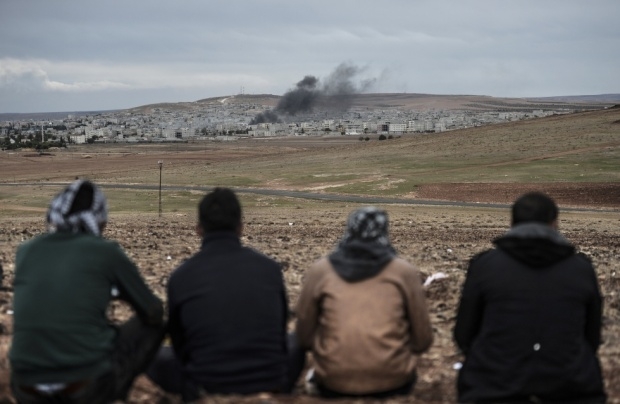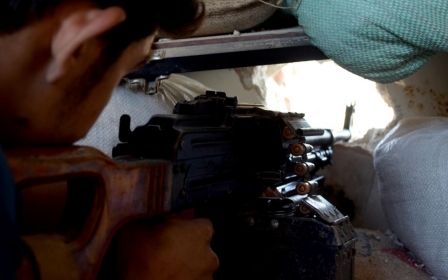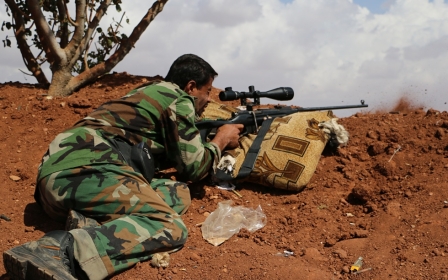Islamic State spills over into Turkish border town

Akçakale, TURKEY - On the surface, the town of Akçakale appears like any other small Turkish border town, but over the past three years residents will tell you it has been transformed into a seedy underground where a wrong turn or a wrong look could pose a serious risk.
The formerly unremarkable town of about 30,000 people hugs the Syrian border sitting beside what is now an Islamic State (IS) stronghold - the town of Tal Abyad, in Syria’s Raqqah Province - with the group’s black flag waving high just a few hundred meters from the border. For a year, the black and white banner has been a persistent reminder to residents of nearby Akçakale of exactly who their neighbours are.
Previously, Syrian rebels affiliated to the Free Syrian Army would pass to and from across the border with ease. Now Islamic State fighters cross back and forth, after taking Tal Abyad from the FSA around a year ago.
Abu Mustafa knows the border well. Before the civil war erupted, Abu Mustafa - not his real name - used to smuggle goods back and forth from Turkey to Syria. Today he mostly deals in people.
“There are a lot of fighters from the Islamic State here in this city [Akçakale], but people keep to themselves. Everybody comes here illegally. It has become good business. We used to take cigarettes across the border, now it is people. Many people want to cross, there are many people who want to join the Islamic State who come to this town for it,” Abu Mustafa told Middle East Eye, taking a puff from the sweet-smelling water pipe sitting by his side.
The coffee shop he sits in is his - he’s been running it for years - but it is obvious the business is one of convenience rather than income. Abu Mustafa sits in his shop during the day, the front windows looking directly out at a chain link fence that marks the Syrian border right across the street a few meters away.
“It’s a nice location,” he says, laughing and taking another puff of the water pipe. “And I get all sorts of customers these days. Free Syrian Army, Islamic State, some people I don’t know and I am happy not to ask who they are - it’s good to be secretive in this town, unless you have good contacts.”
Smuggling in Akçakale is a booming business. The border itself is officially open only to Syrians to pass through and is manned by just a few Turkish soldiers, some of whom wander up and down the fence separating the two cities. Abu Mustafa, however, makes the illegal trip to Syria and back several times a week. According to him, he makes a call to a friend on the other side to get Islamic State permission to enter with his guest, before taking the paying customer to a secretive part of the border which "has no cameras", meeting a contact who will finish the job.
One of his associates, who identified himself only as Ali, claimed he crossed the border every day, happening to have one wife in Tal Abyad, and one in Akçakale. “I prefer the life in Tal Abyad,” he told MEE. “But also I am with the Islamic State, and my cousins work with them. Everyone we take [over the border] is with the Islamic State. If they are with them then we take them over, as they need to have permission.”
While the Turkish government denounces the Islamic State and says it is cracking down on the ease with which its borders are crossed, the people of Akçakale tell a different story.
Abu Mustafa is just a small player among sundry characters who set Akçakale apart. The town, which has only three privately owned hotels, gets few tourists these days. Instead, small hotels tucked away down darkened streets fill up with bearded men sporting the checkered headscarves famous for identifying Arab guerrilla fighters.
Ali doesn’t claim to be a fighter, just a supporter who has connections in the Islamic State-implemented government, but he says many of the people he now sees on the streets of Akçakale are Islamic State fighters from the other side of the border, who frequent the Turkish border town on "business". The border, he says, might as well not exist.
"The border is officially closed, except for a few exceptions, but we can open it whenever we want.” he said with a smile. “It’s easy. There is no border between us and Islamic State territory, we can go back and forth as we please.
"The border is like my family’s house; I just open the door and walk in, no one stops me. Both sides to me are the same, I see the people from the Islamic State side on this side all the time, it is like the same side, there is no border.”
For the long-term residents of Akçakale, the town has become infected with unease. Trust is not easily earned, and residents are unwilling to talk openly. Cafe owners around the town claim that they know nothing outside of their own four walls, despite the very political surroundings in which they find themselves. Many are simply scared to talk when that bring them trouble with visiting Islamic State fighters.
Abdullah Khalil, an elderly Kurdish refugee from Islamic State-controlled Tal Abyad, was, however, keen to buck the trend of silence in the town. Sitting on the grass outside the now empty border terminal, Khalil spoke freely about how he fled, and about the bizarre situation he now finds himself in.
He ran in the hope of getting away from the advancing Islamic State militants, but soon found that the fighters he fled from wander the streets of Akçakale as though they also control the Turkish town.
“I came here to get away from them, but I am seeing Islamic State fighters in this city now, every day,” Khalil said, pointing towards one of the main streets. “It is not safe here, but at least there is still some kind of law here. The Turkish police are here, but I don’t think they do much. But it is still dangerous as they [Islamic State fighters] are here too, just like in Tal Abyad.”
While Tal Abyad is an integral part of the Islamic State’s proclaimed caliphate, Akçakale is not, yet the Turkish town feels like an extension of the Islamic State’s project. Certain streets are regarded as off limits, hardened and scarred fighters lurk at corners. Walking around after sunset is not recommended.
Stories of armed robbery in markets, Western Islamic State recruits roaming the streets searching for a smuggler, are commonly heard.
“This area is still full of their [Islamic State] fighters,” Khalil said. “They don’t know me, and I ignore them, but if you go to the wrong street you will die, if they get the opportunity to kill you they will kill you - if you go to a dark street directly you will be killed. They still have the jihad mind when they are here, even if they are just here on holiday or other business.”
New MEE newsletter: Jerusalem Dispatch
Sign up to get the latest insights and analysis on Israel-Palestine, alongside Turkey Unpacked and other MEE newsletters
Middle East Eye delivers independent and unrivalled coverage and analysis of the Middle East, North Africa and beyond. To learn more about republishing this content and the associated fees, please fill out this form. More about MEE can be found here.




